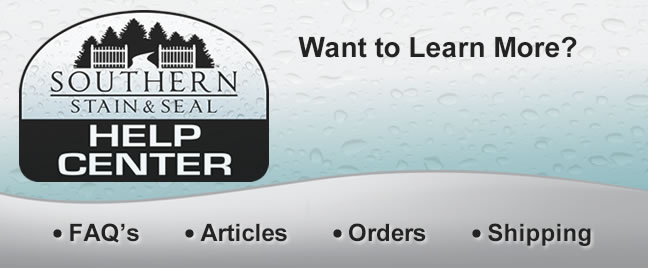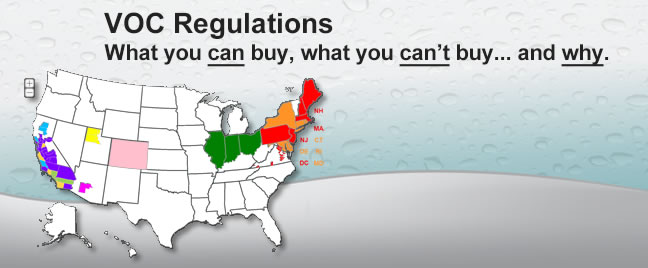Stone masonry is often used in the construction of outdoor hardscapes including stone walls, patios, swimming pool decks, sidewalks and more. There are two common types of stone you will find outdoors that need sealing and waterproofing. Both can be easily damaged by the harsh effects of water and ice. Sealing and waterproofing your stone or flagstone will not only protect it, but can also enhance the color of your stone and reduce the growth of mold, moss and mildew.
Efflorescence can also be a big problem on stone. It is caused by moisture moving through the stone or mortar and dissolving the natural salts and minerals inside. A stone sealer will greatly reduce water penetration and can often stop the effects of efflorescence completely.
Natural Stone
Flagstone, limestone, travertine, slate and bluestone are just a few of the many different types of natural stone or rock used in masonry construction. Natural stone is usually quite durable and is often used for many projects like stone walls, pool decks, water features, patios and sidewalks. Most problems with natural stone occur not with the stone itself, but with the porous mortar that holds it together. Unsealed mortar will quickly absorb water from rain and snow. When this moisture freezes and expands, it can cause cracks to form and can even cause the entire structure to break apart. A water-repellent sealer will stop the water from absorbing and will prevent this type of damage.
Step 1:
Natural Stone Cleaning and Preparation
As with all projects, proper preparation is the MOST important step! Before a protective treatment can be applied, any non-compatible existing sealers MUST be removed and the surface completely cleaned and de-greased to ensure adhesion and penetration. In most cases, a thorough pressure washing is all that is needed before sealing stone that is clean and in good condition. If your stone has an existing sealer that has failed or is incompatible with the new sealer you want to use, you will need to remove the old sealer before re-sealing. Specific issues like efflorescence, rust stains or calcite should be addressed with the proper cleaners before applying any stone sealer or sealant.
For grouted horizontal natural stone such as patios etc. we highly recommend mechanically prepping the stone with a floor machine and an abrasive Mal-Grit brush. This wet scrubbing will smooth, clean and remove a very thin layer of the stone surface, revealing the beautiful true colors of your stone previously hidden by embedded slurry, dirt and contaminates. This scrubbing process is also recommended when stripping old sealers or removing heavy mineral deposits. Before scrubbing or applying any product to any stone surface, be sure to confirm that the process or cleaning product being used is compatible with your specific stone!
- Recommended Products:
 F9 Double Eagle
F9 Double Eagle
Degreaser Nock-Off
Nock-Off
Coating Stripper
Sealing Option 1:
Penetrating Natural Stone Sealers
This is the type of sealer we recommend for most natural stone sealing applications. This type of sealer penetrates deep into the surface, sealing out water and contaminates. Penetrating sealants work 100% below the surface to protect your stone and mortar from within, while still remaining breathable. These sealers do not form a film or change the sheen of the masonry surface. Some such as WB-75 leave a completely natural appearance, while others like Enhancer Shield provide color enhancement for more of that “wet look” many people desire. These sealers do not become slippery when wet, and can never flake, peel or chip like film-forming sealers. These are very effective, long lasting and offer easy application and maintenance. The life-span and level of protection you get from this type of sealer will depend on the quality of the product you choose. Penetrating sealers should never be applied over an existing sealer, unless the previous sealer was a similar and compatible penetrating sealer.
- Recommended Products:
 SurfKoat WB 75
SurfKoat WB 75
Penetrating Sealer Enhancer Shield
Enhancer Shield
Penetrating Sealer
Sealing Option 2:
Wet Look Water Based Urethane Sealers
We include this option only because some customers demand both a wet-look and gloss sealer for stone. If you MUST HAVE a wet-look glossy product for your stone, this is our best recommendation. These urethanes are two-component products that chemically harden like an “epoxy” after you mix part:A and Part:B together. This makes them hard, durable and chemical resistant. Urethanes are also UV stable and will never turn yellow due to UV exposure. Since these urethanes are also water-based, they offer an easy and safe application. So far, we have only found one of these urethanes that performs to our standards, Trident's Hurricane CAT-5. CAT-5 comes in a concentrate form, applies easily by sprayer, is legal for sale in all 50 states and is compatible for use over many types of existing sealers. To maintain protection and appearance, this sealer should have a maintenance coat every 3-4 years.
- Recommended Products:
 Trident CAT-5
Trident CAT-5
Manufactured Stone
Cultured, manufactured or artificial faux stone has become very popular for all types of exterior use. If you have a stone wall on your home or business, and it was built within the last 20 years, there’s a good chance it is covered with cultured or manufactured stone veneer. This type of stone is really just colored concrete that has been cast in the shape of a stone. Manufactured stone accounts for over two thirds of our calls about “stone problems”. These thin porous stones are easily damaged and their thin layer of color is very vulnerable to effects of weathering and acid rain. Manufactured stone is actually so porous that water will absorb completely through the stone and into the wall behind it. Over time this moisture can cause all types of damage including mold, rot and decay. The constant presence of moisture also makes efflorescence a big problem too. Fortunately, cultured stone is also the easiest to protect with the right stone sealer.
Step 1:
Manufactured Stone Cleaning and Preparation
As with all projects, proper preparation is the MOST important step! Before a protective treatment can be applied, any non-compatible existing sealers MUST be removed and the surface completely cleaned and de-greased to ensure adhesion and penetration. In most cases, a thorough pressure washing is all that is needed before sealing stone that is clean and in good condition. If your stone has an existing sealer that has failed or is incompatible with the new sealer you want to use, you will need to remove the old sealer before re-sealing. Specific issues like efflorescence, rust stains or calcite should be addressed with the proper cleaners before applying any stone sealer or sealant.
Extreme care should be taken when cleaning manufactured stone. High pressure water or acidic cleaners can permanently damage the thin layer of color on the surface. Always test FIRST before proceeding with any cleaning process!
- Recommended Products:
 F9 Double Eagle
F9 Double Eagle
Degreaser Nock-Off
Nock-Off
Coating Stripper
Penetrating Manufactured Stone Sealers
This is the type of sealer we recommend for most manufactured stone sealing applications. This type of sealer penetrates deep into the surface, sealing out water and contaminates. Penetrating sealants work 100% below the surface to protect your stone veneer and mortar from within, while still remaining breathable. These sealers do not form a film or change the sheen of the masonry surface. Some such as WB-75 and SB-100 leave a completely natural appearance, while others like Enhancer Shield provide color enhancement for more of that “wet look” many people desire. These sealers do not become slippery when wet, and can never flake, peel or chip like film-forming sealers. These are very effective, long lasting and offer easy application and maintenance. The life-span and level of protection you get from this type of sealer will depend on the quality of the product you choose. Penetrating sealers should never be applied over an existing sealer, unless the previous sealer was a similar and compatible penetrating sealer.
Staining / Coloring Stone
Although staining stone is not a very common practice, there are certain situations where it may be needed or desired. Many concrete color, stain and dye systems are also compatible for staining stone, especially manufactured stone. Be aware that even though these products may be compatible with many stone materials, they will accept the stain much differently than normal concrete. Always perform a test area to ensure desired results.
Acid Stains
Also called reactive stains, these traditional stains create a chemical reaction with the minerals on the surface of the stone. Acid staining is the most common and recommended method of coloring stone, but you should always test for compatibility and acceptable results before using any stain on any stone surface. Available in a variety of earth tones, these UV stable stains are permanent and require a sealer topcoat. All types of sealers can be used over acid stains, but penetrating sealers are the only recommended sealers for stone sealing.
- Recommended Products:
 SurfKoat
SurfKoat
Concrete Acid Stain
















